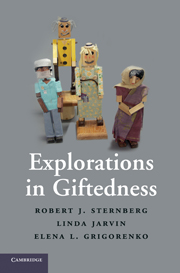Book contents
- Frontmatter
- Contents
- Preface
- 1 What Is Giftedness?
- 2 Theories of Giftedness
- 3 WICS as a Model of Giftedness
- 4 Intelligence and Giftedness
- 5 Creativity and Giftedness
- 6 Wisdom and Giftedness
- 7 Giftedness as Developing Expertise
- 8 Giftedness and Culture
- 9 Learning Disabilities, Giftedness, and Gifted/LD
- 10 Identifying the Gifted
- 11 Educating the Gifted
- References
- Index
2 - Theories of Giftedness
Published online by Cambridge University Press: 05 June 2012
- Frontmatter
- Contents
- Preface
- 1 What Is Giftedness?
- 2 Theories of Giftedness
- 3 WICS as a Model of Giftedness
- 4 Intelligence and Giftedness
- 5 Creativity and Giftedness
- 6 Wisdom and Giftedness
- 7 Giftedness as Developing Expertise
- 8 Giftedness and Culture
- 9 Learning Disabilities, Giftedness, and Gifted/LD
- 10 Identifying the Gifted
- 11 Educating the Gifted
- References
- Index
Summary
Theories of giftedness are diverse. In this chapter, we shall cover some of the main theories, as reviewed in major works on conceptions of giftedness (Renzulli, Gubbins, McMillen, Eckert, & Little, 2009; Sternberg & Davidson, 1986, 2005; see also Phillipson & McCann, 2007).
NO CONCEPTION
It is odd and might even seem oxymoronic to think of no conception of giftedness as a conception of giftedness. But Borland (2005, 2009a) has argued that gifted education would proceed better if we all viewed giftedness as a “chimera” (p. 2). Borland suggests that we dispense with a concept of giftedness for several reasons.
First, Borland asserts, giftedness is a social construct anyway, and one of doubtful validity. There is no absolute, definitive standard for what makes a person gifted. Societies construct their own conception of what they mean by giftedness. And, according to Borland, we all would be better off if they dispensed with the construct. Borland asserts that such a construct is of relatively recent invention. According to him, “there were no ‘gifted’ children in the 19th century” (p. 3).
We do not agree with this assertion. In the first place, the origins of mental testing date back to the ancient Chinese (Thomason & Qiong, 2008). They used tests, among other things, for selecting civil servants. Sir Francis Galton was writing about individuals of extreme gifts in the 1800s, and he is today considered one of the founders of the modern giftedness movement (Galton, 1869).
Information
- Type
- Chapter
- Information
- Explorations in Giftedness , pp. 14 - 33Publisher: Cambridge University PressPrint publication year: 2010
